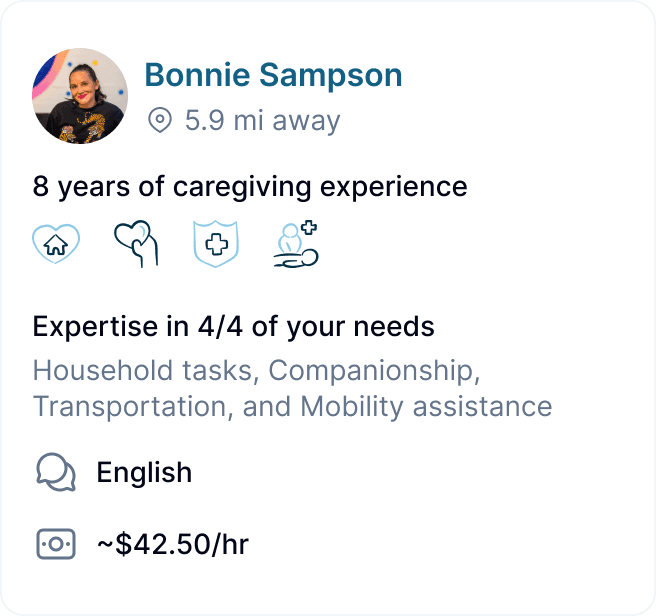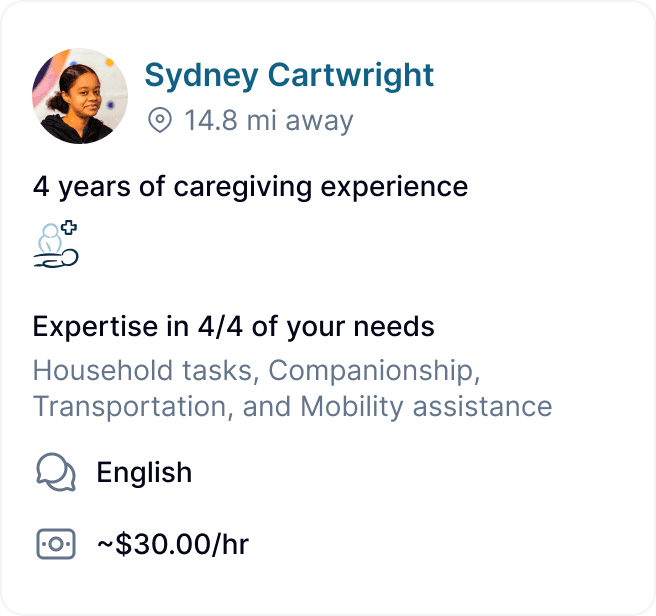What Happens If You Underpay Payroll Taxes? (Hint: It’s Expensive)



When you hire a caregiver or household employee, you take on the role of an employer—and that means you’re responsible for payroll taxes. While it might seem tempting to cut corners or pay “under the table,” the risks of underpaying or failing to pay payroll taxes are serious, and the costs can add up quickly.
Let’s break down exactly what can happen if you underpay payroll taxes, why it’s so expensive, and how Clara can help you avoid these costly pitfalls.
What Are Payroll Taxes—and Why Do They Matter?
Payroll taxes are the federal, state, and sometimes local taxes that household employers must withhold and pay on behalf of their employees. These include Social Security, Medicare (FICA), federal and state unemployment taxes, and sometimes income tax withholding.
These taxes fund essential programs and protect both you and your employee—ensuring eligibility for Social Security, Medicare, and unemployment benefits. (See here for more on "Why should I employ my caregiver legally?")
The Real Costs of Underpaying Payroll Taxes
1. IRS Penalties and Interest
If you underpay payroll taxes, the IRS will require you to pay the taxes you owe—plus penalties and interest. The standard penalty for underpayment is typically 5% of the underpaid amount, capped at 25%, and interest accrues at a rate set by the IRS (recently around 8%). For example, if you underpaid $3,000 in payroll taxes, you could owe an additional $240 in penalties, plus interest that grows the longer the debt goes unpaid.
2. Civil and Criminal Penalties
Underpaying payroll taxes isn’t just a minor mistake—it can be treated as tax evasion, especially if it’s intentional. Penalties can exceed $10,000, and in severe cases, you could face up to $100,000 in fines and even five years in jail if prosecuted as tax evasion. The IRS and state tax authorities take payroll tax compliance seriously, and criminal charges, while rare, do happen—resulting in felony records and prison time for some offenders.
3. State-Level Consequences
States like California have their own strict rules and penalties. Failure to comply with state payroll tax laws can result in additional fines, back wages, and interest. For example, in California, employers who violate overtime, minimum wage, or meal and rest break laws may be liable for back pay, additional penalties, and even civil lawsuits.
4. Lawsuits and Wage Claims
If your caregiver or domestic worker discovers they’ve been underpaid or denied proper tax withholdings, they can file wage claims or lawsuits. Courts can order you to pay back wages, interest, and additional penalties-sometimes totaling tens of thousands of dollars. In one real-life case, a California couple was ordered to pay $265,000 in backpay and legal fees to their in-home caregiver after violating labor laws.
5. Loss of Legal Protections and Insurance
If you pay “under the table” and underpay payroll taxes, you can’t obtain workers’ compensation insurance. That means if your caregiver is injured on the job, you could be personally liable for all medical expenses and lost wages-a risk that can devastate your finances.
6. Impact on Medicaid Eligibility
If you or your loved one may need Medicaid in the future, undocumented payments to caregivers can be flagged as improper asset transfers. This can delay or jeopardize your eligibility for Medicaid, as the program has a five-year “look-back” period to check for unreported transactions.
7. Professional and Personal Repercussions
Tax evasion or fraud can impact your professional life. For example, professionals like doctors or attorneys have lost their licenses over payroll tax violations, and a criminal record can follow you for life.
How Do People Get Caught?
Most families are discovered when a former caregiver files for unemployment or Social Security benefits and there’s no record of employment taxes being paid. States and the IRS share information, so one claim can trigger a full investigation and audit.
What If You Simply Made a Mistake?
Even honest mistakes can be costly. The IRS will still require you to pay the back taxes, interest, and penalties. There’s no statute of limitations for employment taxes, so you can be held liable years after the fact.
How Clara Can Help
At Clara, we know that payroll and tax compliance can be confusing and stressful. That’s why we act as your facilitator—helping you set up compliant payroll, withhold the correct taxes, and file all required forms on time. We also help you navigate state-specific rules, so you’re never caught off guard by hidden requirements or deadlines.
By working with Clara, you can:
Avoid IRS and state penalties
Protect your family from lawsuits and financial risk
Ensure your caregiver gets the benefits and protections they deserve
Maintain eligibility for programs like Medicaid
Conclusion: Don’t Let Payroll Mistakes Cost You
Underpaying payroll taxes isn’t just a small oversight—it can lead to thousands (or even hundreds of thousands) of dollars in penalties, legal fees, and lost peace of mind. The good news? With the right support, it’s easy to do things the right way from the start.
If you want to make sure your household payroll is fully compliant and worry-free, reach out to Clara today. We’re here to guide you through every step, so you can focus on caring for your loved ones-not stressing over tax forms and penalties.
When you hire a caregiver or household employee, you take on the role of an employer—and that means you’re responsible for payroll taxes. While it might seem tempting to cut corners or pay “under the table,” the risks of underpaying or failing to pay payroll taxes are serious, and the costs can add up quickly.
Let’s break down exactly what can happen if you underpay payroll taxes, why it’s so expensive, and how Clara can help you avoid these costly pitfalls.
What Are Payroll Taxes—and Why Do They Matter?
Payroll taxes are the federal, state, and sometimes local taxes that household employers must withhold and pay on behalf of their employees. These include Social Security, Medicare (FICA), federal and state unemployment taxes, and sometimes income tax withholding.
These taxes fund essential programs and protect both you and your employee—ensuring eligibility for Social Security, Medicare, and unemployment benefits. (See here for more on "Why should I employ my caregiver legally?")
The Real Costs of Underpaying Payroll Taxes
1. IRS Penalties and Interest
If you underpay payroll taxes, the IRS will require you to pay the taxes you owe—plus penalties and interest. The standard penalty for underpayment is typically 5% of the underpaid amount, capped at 25%, and interest accrues at a rate set by the IRS (recently around 8%). For example, if you underpaid $3,000 in payroll taxes, you could owe an additional $240 in penalties, plus interest that grows the longer the debt goes unpaid.
2. Civil and Criminal Penalties
Underpaying payroll taxes isn’t just a minor mistake—it can be treated as tax evasion, especially if it’s intentional. Penalties can exceed $10,000, and in severe cases, you could face up to $100,000 in fines and even five years in jail if prosecuted as tax evasion. The IRS and state tax authorities take payroll tax compliance seriously, and criminal charges, while rare, do happen—resulting in felony records and prison time for some offenders.
3. State-Level Consequences
States like California have their own strict rules and penalties. Failure to comply with state payroll tax laws can result in additional fines, back wages, and interest. For example, in California, employers who violate overtime, minimum wage, or meal and rest break laws may be liable for back pay, additional penalties, and even civil lawsuits.
4. Lawsuits and Wage Claims
If your caregiver or domestic worker discovers they’ve been underpaid or denied proper tax withholdings, they can file wage claims or lawsuits. Courts can order you to pay back wages, interest, and additional penalties-sometimes totaling tens of thousands of dollars. In one real-life case, a California couple was ordered to pay $265,000 in backpay and legal fees to their in-home caregiver after violating labor laws.
5. Loss of Legal Protections and Insurance
If you pay “under the table” and underpay payroll taxes, you can’t obtain workers’ compensation insurance. That means if your caregiver is injured on the job, you could be personally liable for all medical expenses and lost wages-a risk that can devastate your finances.
6. Impact on Medicaid Eligibility
If you or your loved one may need Medicaid in the future, undocumented payments to caregivers can be flagged as improper asset transfers. This can delay or jeopardize your eligibility for Medicaid, as the program has a five-year “look-back” period to check for unreported transactions.
7. Professional and Personal Repercussions
Tax evasion or fraud can impact your professional life. For example, professionals like doctors or attorneys have lost their licenses over payroll tax violations, and a criminal record can follow you for life.
How Do People Get Caught?
Most families are discovered when a former caregiver files for unemployment or Social Security benefits and there’s no record of employment taxes being paid. States and the IRS share information, so one claim can trigger a full investigation and audit.
What If You Simply Made a Mistake?
Even honest mistakes can be costly. The IRS will still require you to pay the back taxes, interest, and penalties. There’s no statute of limitations for employment taxes, so you can be held liable years after the fact.
How Clara Can Help
At Clara, we know that payroll and tax compliance can be confusing and stressful. That’s why we act as your facilitator—helping you set up compliant payroll, withhold the correct taxes, and file all required forms on time. We also help you navigate state-specific rules, so you’re never caught off guard by hidden requirements or deadlines.
By working with Clara, you can:
Avoid IRS and state penalties
Protect your family from lawsuits and financial risk
Ensure your caregiver gets the benefits and protections they deserve
Maintain eligibility for programs like Medicaid
Conclusion: Don’t Let Payroll Mistakes Cost You
Underpaying payroll taxes isn’t just a small oversight—it can lead to thousands (or even hundreds of thousands) of dollars in penalties, legal fees, and lost peace of mind. The good news? With the right support, it’s easy to do things the right way from the start.
If you want to make sure your household payroll is fully compliant and worry-free, reach out to Clara today. We’re here to guide you through every step, so you can focus on caring for your loved ones-not stressing over tax forms and penalties.
When you hire a caregiver or household employee, you take on the role of an employer—and that means you’re responsible for payroll taxes. While it might seem tempting to cut corners or pay “under the table,” the risks of underpaying or failing to pay payroll taxes are serious, and the costs can add up quickly.
Let’s break down exactly what can happen if you underpay payroll taxes, why it’s so expensive, and how Clara can help you avoid these costly pitfalls.
What Are Payroll Taxes—and Why Do They Matter?
Payroll taxes are the federal, state, and sometimes local taxes that household employers must withhold and pay on behalf of their employees. These include Social Security, Medicare (FICA), federal and state unemployment taxes, and sometimes income tax withholding.
These taxes fund essential programs and protect both you and your employee—ensuring eligibility for Social Security, Medicare, and unemployment benefits. (See here for more on "Why should I employ my caregiver legally?")
The Real Costs of Underpaying Payroll Taxes
1. IRS Penalties and Interest
If you underpay payroll taxes, the IRS will require you to pay the taxes you owe—plus penalties and interest. The standard penalty for underpayment is typically 5% of the underpaid amount, capped at 25%, and interest accrues at a rate set by the IRS (recently around 8%). For example, if you underpaid $3,000 in payroll taxes, you could owe an additional $240 in penalties, plus interest that grows the longer the debt goes unpaid.
2. Civil and Criminal Penalties
Underpaying payroll taxes isn’t just a minor mistake—it can be treated as tax evasion, especially if it’s intentional. Penalties can exceed $10,000, and in severe cases, you could face up to $100,000 in fines and even five years in jail if prosecuted as tax evasion. The IRS and state tax authorities take payroll tax compliance seriously, and criminal charges, while rare, do happen—resulting in felony records and prison time for some offenders.
3. State-Level Consequences
States like California have their own strict rules and penalties. Failure to comply with state payroll tax laws can result in additional fines, back wages, and interest. For example, in California, employers who violate overtime, minimum wage, or meal and rest break laws may be liable for back pay, additional penalties, and even civil lawsuits.
4. Lawsuits and Wage Claims
If your caregiver or domestic worker discovers they’ve been underpaid or denied proper tax withholdings, they can file wage claims or lawsuits. Courts can order you to pay back wages, interest, and additional penalties-sometimes totaling tens of thousands of dollars. In one real-life case, a California couple was ordered to pay $265,000 in backpay and legal fees to their in-home caregiver after violating labor laws.
5. Loss of Legal Protections and Insurance
If you pay “under the table” and underpay payroll taxes, you can’t obtain workers’ compensation insurance. That means if your caregiver is injured on the job, you could be personally liable for all medical expenses and lost wages-a risk that can devastate your finances.
6. Impact on Medicaid Eligibility
If you or your loved one may need Medicaid in the future, undocumented payments to caregivers can be flagged as improper asset transfers. This can delay or jeopardize your eligibility for Medicaid, as the program has a five-year “look-back” period to check for unreported transactions.
7. Professional and Personal Repercussions
Tax evasion or fraud can impact your professional life. For example, professionals like doctors or attorneys have lost their licenses over payroll tax violations, and a criminal record can follow you for life.
How Do People Get Caught?
Most families are discovered when a former caregiver files for unemployment or Social Security benefits and there’s no record of employment taxes being paid. States and the IRS share information, so one claim can trigger a full investigation and audit.
What If You Simply Made a Mistake?
Even honest mistakes can be costly. The IRS will still require you to pay the back taxes, interest, and penalties. There’s no statute of limitations for employment taxes, so you can be held liable years after the fact.
How Clara Can Help
At Clara, we know that payroll and tax compliance can be confusing and stressful. That’s why we act as your facilitator—helping you set up compliant payroll, withhold the correct taxes, and file all required forms on time. We also help you navigate state-specific rules, so you’re never caught off guard by hidden requirements or deadlines.
By working with Clara, you can:
Avoid IRS and state penalties
Protect your family from lawsuits and financial risk
Ensure your caregiver gets the benefits and protections they deserve
Maintain eligibility for programs like Medicaid
Conclusion: Don’t Let Payroll Mistakes Cost You
Underpaying payroll taxes isn’t just a small oversight—it can lead to thousands (or even hundreds of thousands) of dollars in penalties, legal fees, and lost peace of mind. The good news? With the right support, it’s easy to do things the right way from the start.
If you want to make sure your household payroll is fully compliant and worry-free, reach out to Clara today. We’re here to guide you through every step, so you can focus on caring for your loved ones-not stressing over tax forms and penalties.
More about taxes and legal
More about taxes and legal


Understanding the I-9 Process for Domestic Employees



Clara Editorial Team


Why Every Caregiver Should Sign a Written Agreement (and What to Include)



Clara Editorial Team


Your Legal Liabilities as a Household Employer—Simplified



Clara Editorial Team


Why "Under The Table" Employment Is A Ticking Time Bomb



Clara Editorial Team


The Importance of Proper Contracts for Domestic Workers—Especially For Private Caregivers



Clara Editorial Team


Do Private Duty Caregivers Need Insurance?



Lowrie Hilladakis


Workers' Compensation Requirements for Household Employers: A 2025 Guide for California



Jon Levinson


2024 Tax Guide for Household Employers of Senior Caregivers in California



Jon Levinson


Payroll & Compliance for Care in California



Ian Gillis


Why Should I Employ My Caregiver Legally?



Ian Gillis
GEt started for free
Better care starts with Clara.
Find, hire, and pay top-notch caregivers without the headache for a price that fits your budget.



GEt started for free
Better care starts with Clara.
Find, hire, and pay top-notch caregivers without the headache for a price that fits your budget.



GEt started for free
Better care starts with Clara.
Find, hire, and pay top-notch caregivers without the headache for a price that fits your budget.

